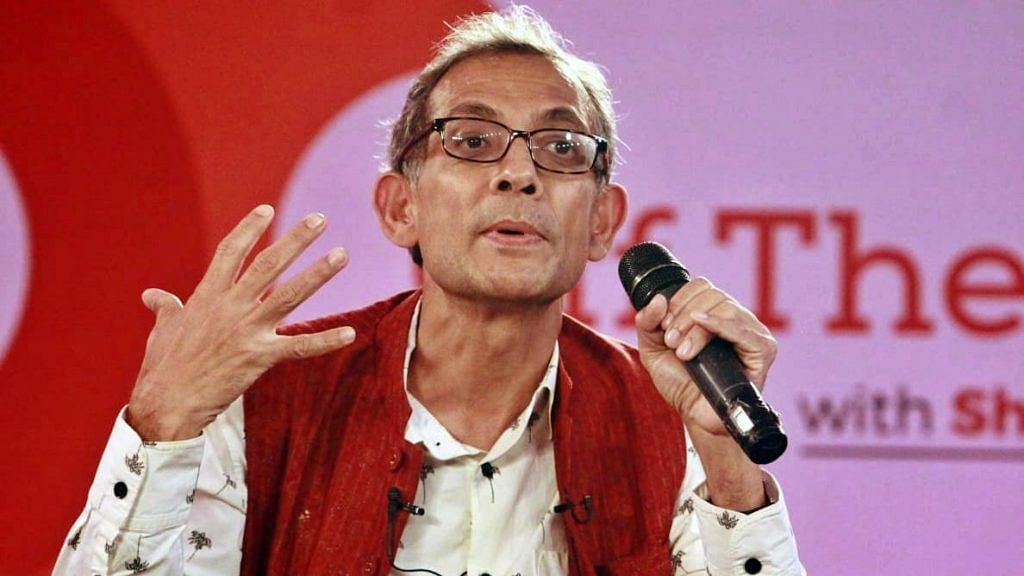New Delhi: The Narendra Modi government should look at providing cash transfer to the bottom 60 per cent of India’s population to help revive the economy, Nobel laureate Abhijit Banerjee has said.
In a conversation with former Congress chief Rahul Gandhi, Banerjee pointed out that increasing the spending power of people may be a better option than a package specifically targeted at micro, small and medium enterprises (MSMEs).
“…it is not clear that targeting the MSME sector is the right channel. It is more about reviving demand. Giving money in the hands of everybody, so that they can buy in stores or they buy consumer goods,” he said during the video chat streamed by the party Tuesday.
“If you are in the red zone, you can say look whenever the lockdown is lifted, you will have money in your account, Rs 10,000 in your account and you can spend it. I think spending is the easiest way to revive the economy,” he said.
Banerjee, who is the Ford Foundation International Professor of Economics at Massachusetts Institute of Technology in the US, pointed out that targeting the poorest will be an expensive exercise. Instead, he favoured transferring funds to the bottom 60 per cent of the population, saying spending by them will create a stimulus effect.
“I think targeting is extremely costly. You try to target in this mess, who has become poor after their shop was shut for 6 weeks. I don’t know how you’d figure this out,” he said.
Banerjee added that India had a demand problem even before the Covid-19 pandemic and it is only going to worsen now.
This is the second conversation Gandhi has held with economists on the pandemic and its economic impact. Last week, the former Congress chief spoke with former Reserve Bank of India (RBI) governor Raghuram Rajan on the steps needed to revive the economy.
The Indian economy has come to a virtual standstill after the Modi government announced a lockdown beginning 25 March to contain the spread of Covid-19, forcing many industries to shut shop and displacing migrant labour. After two extensions, the lockdown is slated to end on 17 May.
To protect firms against bankruptcies, Banerjee suggested, the government should completely cancel debt payments by borrowers for the entire quarter rather than just rescheduling it.
Also read: India sees widest budget gap in 6 years as it breaches target on poor tax collection
Current welfare schemes don’t help migrant workers
Abhijit Banerjee — who was awarded the Nobel Prize for Economics in 2019 along with Esther Duflo of the Massachusetts Institute of Technology (MIT), who is also his wife, and Michael Kremer of Harvard University — advocated providing temporary ration cards to everyone to ensure supply of foodgrains to the needy.
The economist pointed out that in the short run, the welfare schemes and policies put in place by the United Progressive Alliance (UPA) government, and then embraced by the Modi government, are inadequate in the current situation as there are people who are not covered by them.
He alluded to how migrant workers cannot take advantage of the Mahatma Gandhi National Rural Employment Guarantee Scheme or the access to foodgrains under the National Food Security Act.
“…what do we do with the people who are not covered by that? That is a lot of people. The migrants in particular,” he said, adding that making Aadhaar the basis of the public distribution system and other things would have saved a lot of misery.
“When you are in dire straits, being brave is the only option,” said Banerjee.
India needs a large stimulus package
The economist also pointed out that India needs a large stimulus package — much larger than the package equivalent to 1 per cent of GDP announced so far.
“We really haven’t decided on a large enough stimulus package. We are still talking about 1 per cent of GDP. United States has gone for 10 per cent of GDP,” he pointed out.
Need to cancel debts for one quarter
Abhijit Banerjee also flagged the need to completely cancel debt payments by borrowers for the entire quarter rather than just rescheduling it in a bid to protect firms against bankruptcies. In March, the RBI had announced a three-month loan moratorium on all term loans providing a reprieve to the borrowers.
“We have done one thing that I think is wise, which is to kind of put a moratorium on debt payments. We could do more than that. We could even say that the debt payments for this quarter will be cancelled and will be taken care of by the government. It’s not just a matter of rescheduling it, just permanently cancel it,” he said.
Also read: Modi govt’s relaxed lockdown not enough to revive India economy, says Axis Bank study
